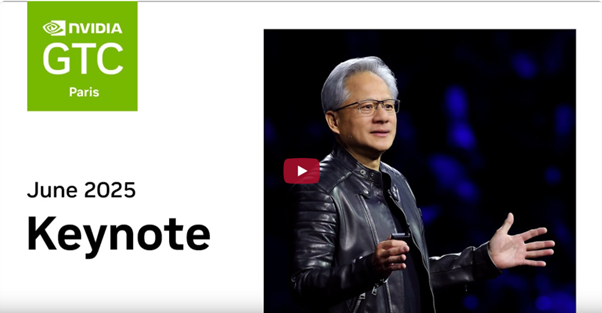When NVIDIA CEO Jensen Huang addressed the audience at VivaTech 2025 in Paris, expectations were high. Instead of offering predictable product launches or technical showcases, Huang provided something far more consequential: a clear, strategic call-to-action for Europe’s technological future. His speech outlined a critical crossroads where Europe must choose between asserting leadership or risking strategic dependency in the global AI landscape.
Huang described artificial intelligence as the « greatest equalizer the world has ever created. » Rather than a theoretical statement, he emphasized a practical, infrastructure-driven reality. AI, he explained, has evolved from enhancing computational efficiencies into an indispensable foundation for national sovereignty, akin to critical infrastructure such as transportation or energy systems. The implications are clear: the countries that master AI infrastructure will profoundly shape their economic competitiveness and strategic autonomy.
Europe, according to Huang, possesses significant advantages: exceptional technical talent, renowned universities, forward-thinking regulators, and historically robust public-private collaboration. However, possessing these resources alone is insufficient. The decisive factor, Huang argued, will be Europe’s ability to rapidly scale computing power and integrate AI capabilities at a genuinely sovereign scale.
To underscore NVIDIA’s commitment to Europe’s strategic autonomy, Huang highlighted major partnerships, including the extensive collaboration with Mistral AI in France, involving the deployment of 18,000 Blackwell GPUs. This collaboration is part of a broader European initiative, comprising similar large-scale « AI factories » planned across Germany, Italy, Spain, Finland, and the UK. These facilities, Huang noted, are akin to factories that produce intelligence rather than physical goods, symbolizing a profound shift toward data-driven industrial sovereignty.
Critically, Huang’s address went beyond technology. He positioned AI infrastructure explicitly as geopolitical infrastructure, emphasizing that dependence on external tech providers or cloud services poses a strategic vulnerability. Europe’s future, he asserted, hinges on its ability to control and leverage its computational infrastructure and data sovereignty. At the same event, NVIDIA presented its advancements in « agentic AI, » showcasing systems with autonomous reasoning, decision-making, and interaction capabilities. Demonstrations included Grek, an AI-integrated robotic system that seamlessly combined physical and digital intelligence. The practical reality of autonomous systems is upon us, and Huang stressed Europe’s unique opportunity to establish global standards in AI ethics, governance, and application.
Quantum computing also featured prominently in Huang’s keynote. Once viewed as a distant prospect, Huang confirmed quantum computing is now reaching practical applications. NVIDIA’s recent collaborations, including partnerships with Harvard and MIT to develop hybrid quantum-AI systems, reflect this significant milestone. Europe, he implied, must equally invest and position itself prominently in this transformative domain.
European governments appear increasingly responsive to this strategic imperative. Countries such as France, Germany, and the UK have already committed billions of euros toward sovereign compute infrastructures. These investments mark a noteworthy alignment between political foresight and technological innovation. Nevertheless, substantial challenges remain, including energy efficiency, regulatory coherence, ethical governance, and equitable technological access. As business leaders, policymakers, and technologists reflect on Jensen Huang’s critical message, the strategic implications for Europe are undeniable. The question is not merely if Europe recognizes the urgency, but rather the speed, scope, and effectiveness of its response.
Jensen Huang’s VivaTech keynote was a strategic roadmap. Europe now stands at a critical juncture. Its actions today will decisively shape whether it emerges as a global AI leader or becomes a marketplace reliant on external innovation.



